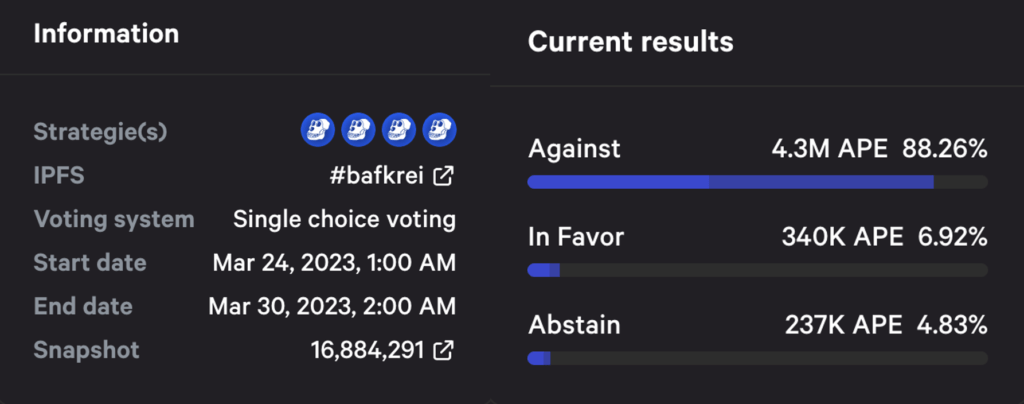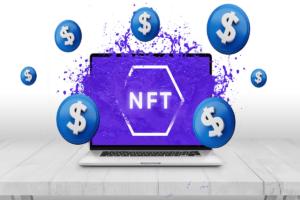ApeCoin DAO has recently made a significant decision regarding the introduction of two new NFT collections. The community voted against the addition of the two new NFT collections, which would have expanded the APE ecosystem’s offerings.
This decision highlights the power of decentralized decision-making and underscores the significance of community-driven governance. ApeCoin is an Ethereum governance token used to facilitate decision-making in the APE ecosystem.
Proposed New NFT Collections
ApeCoin allows holders to participate in the governance process regarding the development and direction of various projects within the Ape ecosystem. These include blue-chip NFT collections such as Bored Ape Yacht Club (BAYC), Meebits, and Mutant Ape Yacht Club (MAYC).
Aaron Leupp presented the AIP-206 proposal on January 13, aiming to create 20,000 items from two collections: Ape Coin Armoury Club and Ape Coin Pet Club. The collections were intended to bring ApeCoin into the metaverse, offer greater utility, and incentivize growth.
Thanks everyones vote so far! 🫡💙🦧@nobody_vault its all good you Voted Against it, just let me know if anything we can change you think could get your Yes vote next time around or more information we can give you on it that may have been missed if you have any questions. In… pic.twitter.com/wM8UAkZZE6
— AaronLeupp.eth (@AaronLeupp) March 25, 2023
In the proposal, Leupp stated that “We are open to all debates, criticism, feedback, counters and thoughts since we would love to be a part of such a pioneering venture as this, and also would really love to continue to prove ourselves.”
Project Cost and Voting Results
The proposal, which would have cost $168,000, aimed to design collections similar to The Sandbox [SAND] and Decentraland [MANA]. This marked another attempt by Yuga Labs to expand its NFT participation.

Currently, almost 89% of voters have rejected the proposal, while only 6.92% support it. Although looking bleak for the ‘Yes’ voters, the vote is still ongoing. The proposal sought to offer the community ownership of these items at no cost and provide opportunities for BAYC, MAYC, and other collection holders to pivot.
Final Thoughts
Ultimately, the ApeCoin community‘s rejection raises questions about the sustainability of the NFT market. While blue-chip collections have experienced a decline in volume, Crypto Punks remains an exception.
The rejection of the AIP-206 proposal highlights the community’s cautious approach to expanding its NFT collections and emphasizes the importance of community governance in the ApeCoin ecosystem.
Frequently Asked Questions
What is Apecoin?
APE is a community-driven token designed to empower the future, constructed and governed by its members. This decentralized protocol layer will facilitate community-led endeavors that propel culture into the metaverse.
What is the Ape Foundation?
The APE Foundation aims to nurture the expansion and evolution of the APE ecosystem equitably and inclusively. By employing the Ecosystem Fund, managed through a multisig wallet, the foundation covers its expenses as directed by the ApeCoin DAO. This structure enables ApeCoin holders to engage in collaborative, open, and unrestricted governance procedures.
What is the ApeCoin DAO?
The APE Improvement Proposal Process (refer to Governance) empowers ApeCoin DAO members to determine the allocation of the Ecosystem Fund, governance regulations, projects, collaborations, and more. ApeCoin DAO membership is accessible to all ApeCoin holders.
What is the board?
A unique council within the APE Foundation, referred to as the DAO’s “Board,” offers supervision over the Foundation administrators at the request of ApeCoin DAO members. The Board’s primary function is to manage DAO proposals and fulfill the community’s vision. It convenes on proposals that necessitate administrative evaluation under ApeCoin DAO regulations. The inaugural Board serves a six-month term, followed by annual voting on Board members by DAO members.
Author
-

Digital asset maven with a keen interest in the valuation and cultural significance of NFTs.




